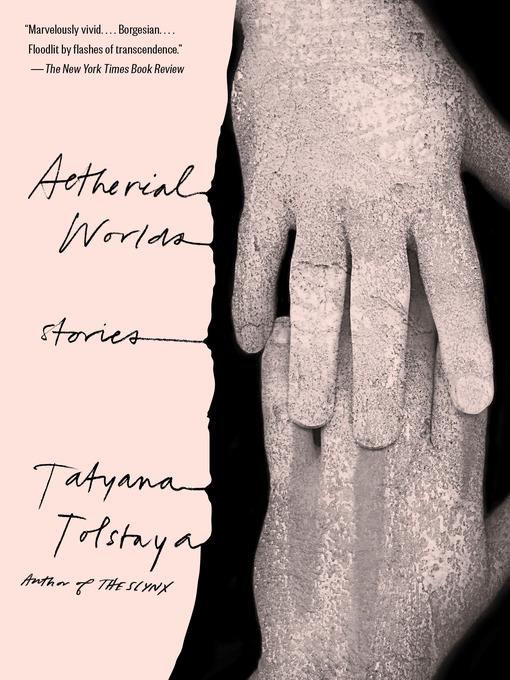
Aetherial Worlds
Stories
کتاب های مرتبط
- اطلاعات
- نقد و بررسی
- دیدگاه کاربران
نقد و بررسی

Starred review from January 8, 2018
These uniformly masterful stories from Tolstaya (The Slynx) reject any attempt at easy categorization, resulting in a profound, surprising, and rich experience. Some stories, like the title work, which details a narrator named Tatyana’s unhappy experience teaching creative writing to American college students in 1992 and owning a home in New Jersey with endless problems, seem straightforwardly autobiographical. Other stories, such as “The Invisible Maiden,” about memories of a dacha, or “A Young Lady in Bloom,” which recalls a stint delivering telegrams as a student, echo the lyricism of the Russian masters and glow with “the swanlike whiteness of the past.” Others are more essayistic: “The Square” meditates on the frightening painting of the artist Kazimir Malevich; “Official Nationality” modestly distills the Russian character to three bullet points: “boldness, longanimity, and ‘Let’s hope.’ ” Some, such as “The Window,” are surreal allegories in the manner of Gogol. While the works blend fantasy and fact, often within the same story, what unites them all is Tolstaya’s singular and assured voice, capable of beautiful specificity—noticing “the calm blue flower of propane” on a stove—and of surveying history from above and proclaiming, matter-of-factly, that “autocracy is basically self-explanatory.” Agent: Andrew Wylie, the Wylie Agency.

January 15, 2018
Long-awaited new collection of stories by Russian writer and former talk show host Tolstaya (The White Walls: Collected Stories, 2007, etc.).Related to Leo Tolstoy (albeit distantly) as well as Ivan Turgenev, her grandfather the science-fiction and historical novelist Aleksey Tolstoy, Tolstaya admits in the opening, semiautobiographical story "20/20" to having the latter's "ability to daydream...although not to the same extent." That story goes on to describe a period of blindness following eye surgery, when she discovered the ability to see, not just remember, the past and enter a "heretofore invisible, hidden world" of the imagination. A poet of silences and small gestures, Tolstaya often writes of love, if sometimes love that has gone off the rails because one or the other of the partners is either not listening or asking the wrong questions; says Eric, the illicit lover of one emigre academic, "Tell me something surprising about your alphabet. The Russian alphabet." Answering that it has a letter that represents, yes, "a certain type of silence," she wonders why he wants to know, inasmuch as he has no intention of learning Russian and therefore no need for that bit of information. And what of mere curiosity? Well, that way lies trouble. Several stories are set on campus, but some of the most memorable take place in quiet places such as the Russian woods far from the city: "It's the most important place in the world--nowhere," Tolstaya writes. Meanwhile, in the city, life's daily difficulties mount: in a wonderful apercu, a beleaguered apartment dweller in the middle of a renovation notes that, as the famed clay tablets of early Greek civilization recorded that a carpenter named Tirieus didn't show up for work, contemporary carpenters are just as "eternally flaky": "a Russian carpenter (or plumber, tile layer, spackler) stretches out his arm to his Mycenaean brethren across millennia: Workers of the world unite, if not in space then in time."Elegant, lyrical tales woven with melancholy and world-weariness--but also with a curious optimism. A gem.
COPYRIGHT(2018) Kirkus Reviews, ALL RIGHTS RESERVED.

March 15, 2018
In the first story of this new collection, celebrated Russian woman of letters Tolstaya (The Slynx) reflects on how she began writing in the first place. At 32, after undergoing eye surgery, she was blind for three months and could suddenly remember episodes from her life vividly and describe them effortlessly. This fluid remembrance is in full effect in these stories, many of which could be described as personal essays or family histories. "The Invisible Maiden" chronicles the family dacha and its inhabitants, while "A Young Lady in Bloom" recounts her job delivering telegraphs. There are also shorter stories, ruminations on single events, such as the death of a man she almost had an affair with years prior. She also writes lyrically about the connections between artists and writers, as in "The Square," about the painter Kazimir Malevich. VERDICT Well known in Russia as an author, professor, and cohost of a popular TV show about politics and culture, Tolstaya may attract new readers of literary fiction with her thoughtful, sometimes magical prose. Others may find these stories too slow, but fans of Russian literature and culture will relish this first work to be translated in 20 years. [See Prepub Alert 10/5/17.]--Kate Gray, Boston P.L., MA
Copyright 2018 Library Journal, LLC Used with permission.

March 1, 2018
Praised by Nobel laureate Joseph Brodsky (1940-96) as the most original, tactile, luminous voice in Russian prose, Tolstaya, two decades on, is all that and more in this edgy, brash, slyly surreal, and mordantly funny short story collection, which begins with the sudden awakening of a woman's literary imagination, an inherited gift. Tolstaya further considers the mysteries of storytelling in mischievously caustic tales about an unnervingly pragmatic Russian writer teaching at a New England college. Other vivid and upending tales are set in hardscrabble Russian cities and rotting dachas. Provocative comparisons of the two superpowers inject witty and bracing historical perspectives into the epic struggles of various characters to establish and preserve a home. Historical figures Leo Tolstoy (a relative of Tolstaya's), Kazimir Malevich, and Emanuel Swedenborg appear, as do ghosts and angels and characters spellbound by nature's beauty only to be abruptly slapped back to reality as Tolstaya contrasts family troubles, poverty, lies, and tyranny with the aetherial worlds of love, dreams, memories, and myths. Tolstaya's daring, masterful stories, crisply translated, glint and whirl with extraordinary dimension and force.(Reprinted with permission of Booklist, copyright 2018, American Library Association.)

























دیدگاه کاربران